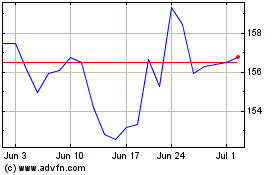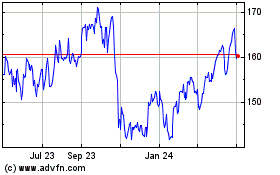Oil Companies' Profits Fall Short of Crude-Price Rally
July 27 2018 - 9:39AM
Dow Jones News
By Bradley Olson
The world's largest oil companies continue to disappoint
investors with underwhelming profits that have fallen far short of
a rally in crude, reflecting the fragile nature of a recovery from
one of the worst price crashes in a generation.
Exxon Mobil Corp. said quarterly net income rose to $4 billion
from April to June, up 18% compared with the same period a year ago
but substantially below the more than 50% that oil prices rose in
that time. Production fell to 3.6 million barrels of oil and gas a
day, the lowest in more than 20 years, as an earthquake in Papua
New Guinea, led to lower volumes.
Profits at Chevron Corp. more than doubled to $3.4 billion and
the company announced plans to begin buying back about $3 billion
in shares annually. Shares at both companies declined early Friday
as the results fell well short of Wall Street expectations.
While the oil giants are set to generate record amounts of cash,
they have been slow to give more of that back to investors, another
factor that has sowed dissatisfaction. Exxon, Chevron and other
large companies posted their highest second-quarter profits since
2014, when oil prices began a decline that bottomed out at below
$30 a barrel. Yet as crude has recovered to about $70 a barrel,
many are still holding back on spending and shareholder payouts as
they recover from the painful downturn.
Together with European oil giants Royal Dutch Shell PLC, BP PLC
and France's Total SA, the five largest Western companies are set
to generate about $90 billion a year in excess cash in 2018 and
2019, exceeding records set in 2008 when oil sold for almost $150 a
barrel.
Yet they are paying out far less of their cash haul to
investors. In 2008, the five companies generated about $85 billion
in excess cash, the highest ever, and bought back more than $50
billion in shares, according to FactSet.
This year, the buyback total is unlikely to exceed $12 billion,
just 14% of the free cash flow expected by analysts at the five
companies. The demand for more cash reflects shareholder skepticism
about long-term oil and gas investments. As oil prices rose above
$100 a barrel, many companies increased spending by tens of
billions of dollars and failed to boost production or returns.
"Oil companies spent like drunken sailors in the last decade
without generating great returns," said Mark Stoeckle, chief
executive of Adams Funds, which owns about $175 million in Exxon
and Chevron shares. "Investors now are much more interested in
spending discipline and stock buybacks."
Smaller oil and gas producers are paying out far more, and
shareholders are rewarding them for it. Anadarko Petroleum Corp.,
which has a market capitalization of $37 billion, bought back
almost $3 billion in shares from September to March.
The company announced it would buy back an additional $1 billion
through June of 2019. Including reinvested dividends, shares are up
62% in the last year, more than double the average increase among
large companies like Exxon and Chevron. ConocoPhillips, which has
authorized the repurchase of about 20% of its shares outstanding,
has risen 67% in the last year, including dividends. That is more
than three times the gain on the S&P 500 index.
Shell fell by more than 3% Thursday after profits fell short of
expectations. The company announced a buyback of $25 billion
through 2020, yet some shareholders were disappointed that only $2
billion shares will be repurchased in the next two months, analysts
said.
BP shares fell slightly in premarket trading Friday after the
company announced plans to spend $10.5 billion to buy most of the
U.S. shale business of BHP Billiton Ltd. Last year, BP returned to
buying back shares to offset the dilution from its scrip dividend
program, but the company has yet to embrace a multibillion-dollar
share buyback program.
Exxon and Chevron, which collectively bought back $15 billion to
$25 billion in shares annually when oil sold for more than $100 a
barrel before the crash, have yet to return to large-scale buyback
programs.
"The market loves capital discipline and shareholder returns,"
said Kris Nichol, an analyst at consultancy Wood Mackenzie Ltd.
"The majors, so far, have been adhering to capital discipline, but
they haven't been on the front foot in terms of shareholder
returns."
Write to Bradley Olson at Bradley.Olson@wsj.com
(END) Dow Jones Newswires
July 27, 2018 09:24 ET (13:24 GMT)
Copyright (c) 2018 Dow Jones & Company, Inc.
Chevron (NYSE:CVX)
Historical Stock Chart
From Mar 2024 to Apr 2024

Chevron (NYSE:CVX)
Historical Stock Chart
From Apr 2023 to Apr 2024
